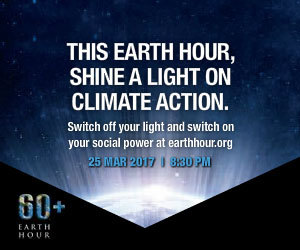17 March 2017
Earth Hour - kick off the year’s Energy Conservation Efforts
Earth Hour occurs this year at 8:30pm on March 25th. It's an opportunity to show your commitment to addressing climate change through energy conservation and time shifting.

Earth Hour is a WWF initiative that encourages people around the world to show their commitment to addressing climate change through a symbolic lights-out hour scheduled this year for 8.30 pm on Saturday 25 March.
Some people may consider this tokenism, but at Smart Energy Solutions we believe that the situation in New Zealand is more compelling and that making Earth Hour the start of our winter conservation & time shifting efforts we are making a big step towards 100% Renewable & non-carbon-emitting power generation.
Energy Conservation & Time-shifting are key
About 20% of our electricity generation is sourced from carbon-producing means and much of that is to help meet our "peak demand" on cold autumn & winter nights.
To reduce our peak demand for electricity it’s energy conservation (switching off) and time shifting that make the difference rather than things like solar PV unless it’s linked to battery storage.
You can save on your existing power bills through consevation efforts and also by time shifting if your power company offers night rates.
Small Changes make a difference
If 100,000 NZ households:
- switch 15 downlights/bulbs from incandescent to LED fittings it would conserve around 528,000kW each winter evening.
- run their dishwasher at bedtime instead of straight after dinner it would time shift around 74,000 kW of power away from peak demand every day.
Changing Habits
If enough of us simply change our habits we can make a difference to the environment.
1) Turn off all unnecessary lights
2) Don’t set your dishwasher to run until you go to bed.
3) Run your laundry appliances overnight too.
4) Have a late shower just before bed so water heats overnight.
5) Switch to LED bulbs
Invest in being part of the solution
You can also improve your home and make a permanent ongoing savings in energy use. These changes will impact on your winter evening power use.
1) Insulate your home to reduce heating costs 2) Switch to energy efficint clean heat sources (heat pumps) 3) Upgrade to LED bulbs & downlights 4) Look at more energy efficient water heating options 5) Upgrade to thermal curtains 6) Choose Energy Star laundry & dishwasher appliances with a delayed start option.
If you’re not sure what the next step is to reduce the energy footprint of your home to save money and the planet - get a Free Home Energy Plan from us. We evaluate various energy products for your home, provide free advice so that you understand the impact they will have on your pocket and the planet.
And switch off the lights at 8.30 on Saturday!
Notes:
* LED CONSERVATION ESTIMATE IS BASED ON 100,000 HOUSEHOLDS SWAPPING 15 OF THEIR 100W INCANDESCENT BULBS THAT RUN 4 HOURS PER DAY TO 12W LED LIGHTS WHICH HAVE EQUIVALENT LIGHT OUTPUT.
* DISHWASHER TIME SHIFTING EFFECT IS THE ESTIMATED ENERGY OF 100,000 STANDARD 14 PLACE DISHWASHERS. DISHWASHERS POWER USE IS BASED ON 0.74 KW PER CYCLE (271 KW/365 USES)